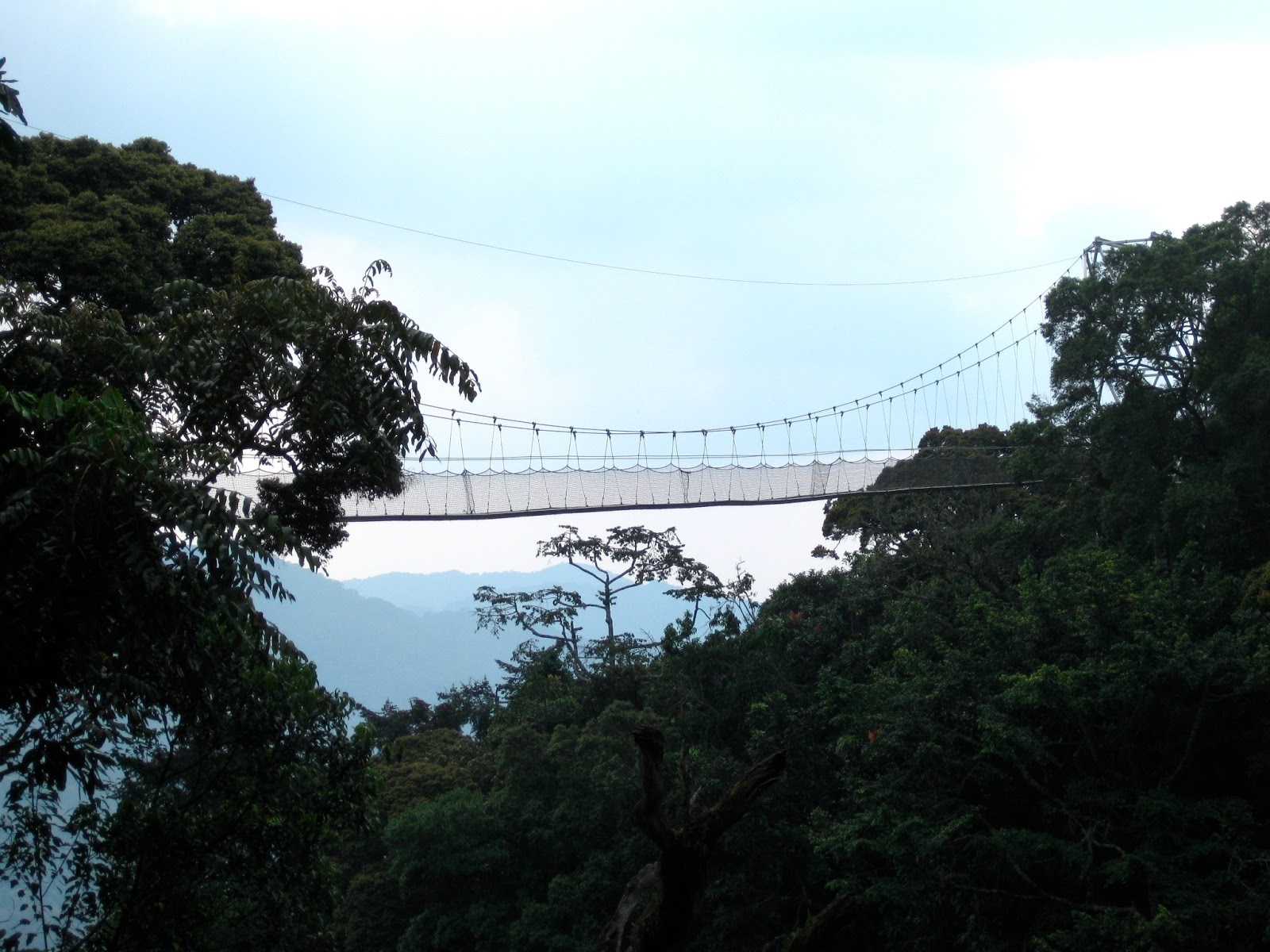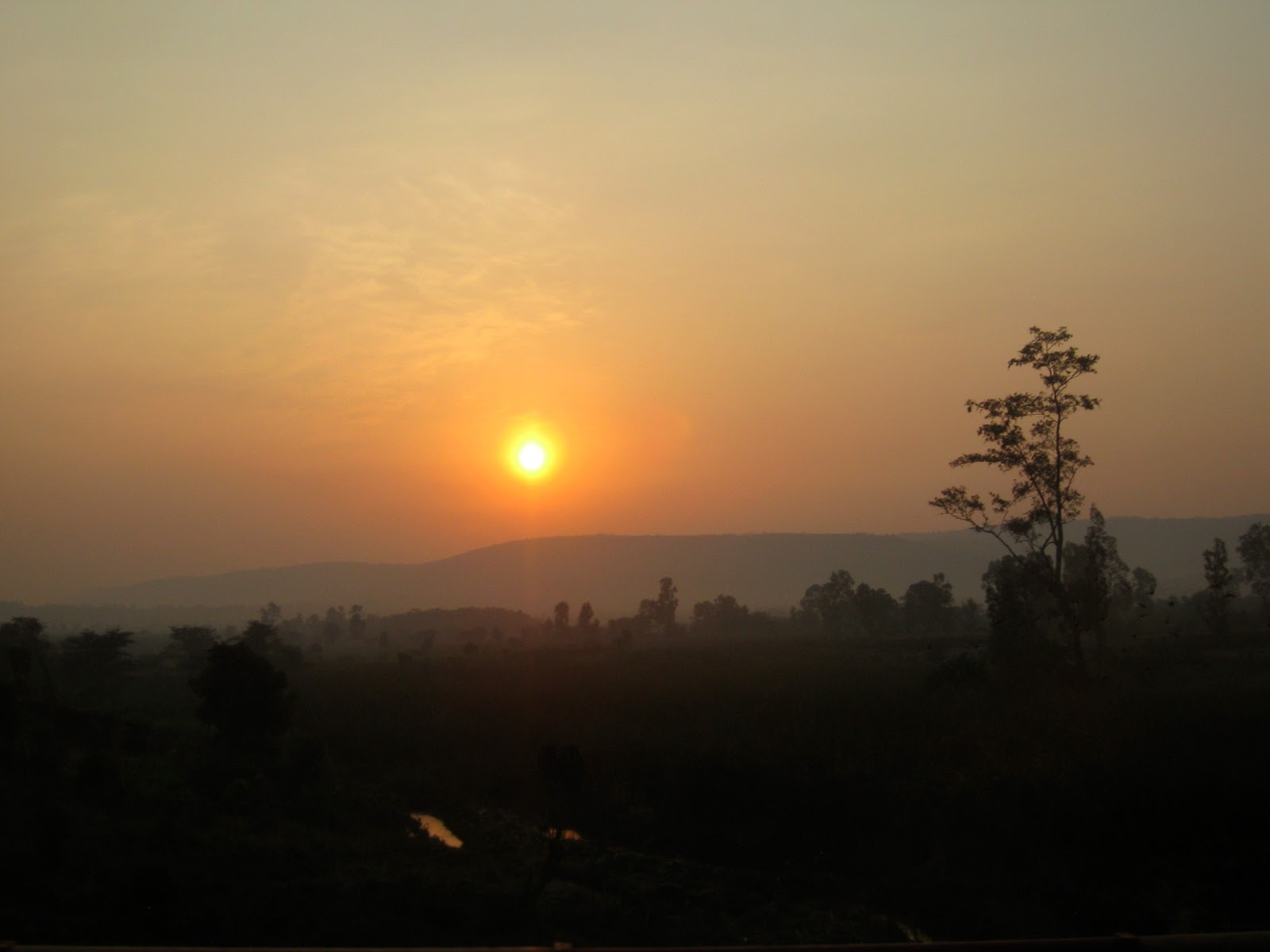Much like my weekends in L.A., my weekends in Africa are
spent doing something new. Our first weekend after we arrived in Kigali on
Sunday was spent on the Millennium Village tour, which I already wrote about in
a previous entry (scroll down).
Our second weekend was spent in the Nyungwe rainforest. Nyungwe is in the western province of Rwanda and it took us about five hours to get there by bus. I love road trips, especially ones through scenic routes. They call Rwanda the land of a thousand hills, but I’m convinced that there are way more than that because I am fairly certain we drove through a thousand hills just to get to Nyungwe.
Embarrassing myself... in Africa.
Our second weekend was spent in the Nyungwe rainforest. Nyungwe is in the western province of Rwanda and it took us about five hours to get there by bus. I love road trips, especially ones through scenic routes. They call Rwanda the land of a thousand hills, but I’m convinced that there are way more than that because I am fairly certain we drove through a thousand hills just to get to Nyungwe.
In the park, there are several different hikes to choose
from ranging from a couple of hours to a whole day. As a group, we decided to
do the canopy walk, which would require a 40-minute hike just to get to the
canopies. I can say with conviction that hiking through a rainforest was one of
the most amazing things I will ever experience in my life. It was so serene,
especially when we broke off from the main group and took a quieter path through
the bottom of the forest. The creek trickling beneath us added to the tranquil ambiance.
Trail name... in Africa.
Hiking... in Africa.
Dr. Cote being pensive... in Africa.
Up in the canopy, we were able to see some of the most
spectacular views of the forest. I’ll let the pictures do the talking.
Even though I am afraid of heights, I wasn’t afraid to walk
across the canopy. I think I knew subconsciously that this was a
once-in-a-lifetime experience and I wasn’t going to let my fear hinder me.
Canopy walk... in Africa.
Getting over my fear... in Africa.
It was somewhat disappointing that we were unable to see any
wildlife in the forest, but we would get our fill of African animal sightings
the following weekend…
Our third weekend in Rwanda was spent on the opposite side
of the country, in the eastern province. Akagera was only a two-hour drive away
from us, but we had to get up even earlier than we did for Nyungwe since you
can only see safari animals early in the morning. Yes, I said SAFARI. When in
Africa, you HAVE to go on a safari. They should make it mandatory because you
won’t be able to do it anywhere else in the world.
We left at 5am and ironically my roommates and I got locked
IN our house. We finally escaped through the back door, but we ran to catch the
jeeps just before 5am in fear of them leaving us behind. There was no way I was
going to miss this experience!
A sunrise... in Africa.
The jeeps we rode in were monstrous. The roof opened up so
we could stand up and get better views of our surroundings. We saw so many
different animals including zebras, impalas, hippos, and so many different
species of birds. The only animal that we didn’t see was the African elephant.
We drove past where they are usually seen but all we could find were the large
gaps in the trees where they had been and piles of their poop.
Our transportation... in Africa.
Akagera... in Africa.
Riding in the back of the jeep... in Africa.
Zebras... in Africa.
Impalas... in Africa.
A bald eagle... in Africa.
Pretty bird... in Africa.
Hippos... in Africa.
Baboons... in Africa.
There are no lions in Rwanda but next year they are
introducing four of them into the wild. I guess I’ll have to come back next
year!
Group photo... in Africa (photo courtesy of Mason Cote).
For our fourth weekend in Rwanda, we just stayed in Kigali.
We did different activities that made me forget that I was in Africa for a
change. Friday after working in the hospital, we all went to see the new
superman movie, Man of Steel, in mu
mugi (in town). On Saturday, we went to Mille Collines, which is the hotel that
Hotel Rwanda is based off of. I
enjoyed a nice drink by the pool and then claimed a hammock to lie on in the
sun. It was so relaxing and it wasn’t until we walked to catch a bus that I
realized I wasn’t in America.
Our fifth weekend, our rather last weekend, was our first
weekend in Musanze. We spent it getting settled into our new home with the help
of our BMET (biomedical engineering technician), Jean-Claude, and our Rwandan friend,
Alex. Jean-Claude took us out to a bar in town one night and we enjoyed some
beer, brochettes (kabobs), and roasted potatoes. On Sunday, Alex introduced us
to his ginormous family. We first met his uncle, who is a Catholic priest and a
headmaster at a grade school.
After mass, we drove to Alex’s house to have a family lunch.
There were met his father, his mother, his brothers, his nieces and nephews,
his cousins, and his best friend and his family. Like I said, his family is
HUGE.
My family.. in Africa.
Lunch was fantastic and it was so nice to see his family. It
made me nostalgic of my own home, having a home-cooked meal and enjoying it
with family and friends. Have I mentioned that I miss home? I miss my family,
which is weird since I should be used to not seeing them while I’m at Purdue. I
think it’s the fact that I am halfway across the world from them that just
makes me sad. My mother already promised to bring a cheesecake to the airport
for me when she picks me up because it’s the one food that I’ve been craving
the most! It’s going to make the wait so much sweeter!










































